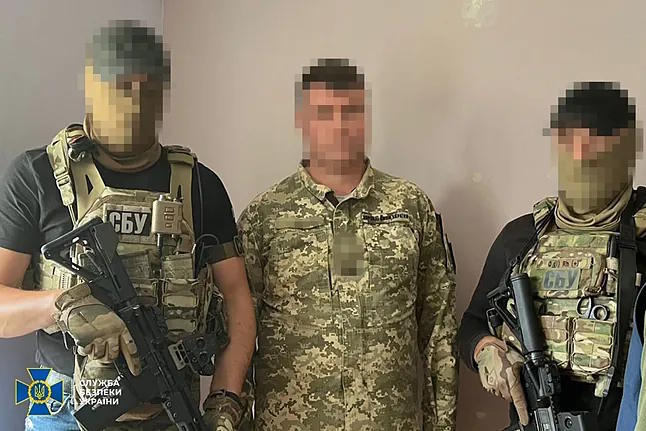The depth of Russian spies' penetration into the Ukrainian state remains a daily challenge for Kiev. Moscow even managed to infiltrate two sleeper agents into the security circle responsible for protecting President Zelenski. This Thursday, Ukraine revealed its latest discovery: one of its elite pilots, trained to fly Western fighters F-16 and Mirage 2000, was providing key information to the enemy about base positions and aircraft locations, crucial for keeping Russian bombers at bay.
This unidentified officer, a flight instructor with the rank of commander, is accused of aiding Russia in conducting airstrikes by providing coordinates and even suggesting attack tactics to evade Ukrainian anti-aircraft defenses. The country has about 30 units of these aircraft and expects more to arrive in the coming months.
According to the SBU, Ukraine's security office, this pilot had been secretly working for Russia for months and was caught in the act of sending a new batch of data. According to the same source, this pilot, described as "the traitor" whose identity remains veiled in the published photos, faces life imprisonment under Ukrainian military laws.
This pilot joins Colonel Dimytro Koziura, head of the SBU's anti-terrorist unit, who was arrested five months ago on charges of passing key military information to Moscow. Since the start of the invasion in February 2022, the SBU has initiated over 3,200 cases of state treason, highlighting the extent of the internal espionage problem. Teenagers recruited by the FSB pose a significant threat of espionage combining sabotage and local infiltration. Additionally, Ukraine faces a major issue with pro-Russian informants in the Donbass region, who often pinpoint military targets for the occupying forces.
Meanwhile, Russia continues its campaign of indiscriminate terror against Ukrainian civilians. Last night, Russian autocrat Vladimir Putin's response to Donald Trump's 10-day ultimatum was a new wave of death and destruction on Kiev: in a combined attack involving over 300 drones and several Iskander ballistic missiles, the bombardment left 11 dead and 135 wounded, with at least six young children among the casualties.
The targets, as is customary, are residential buildings throughout the city. Some of them were completely destroyed. While rescue services were pulling neighbors out of the rubble, the Kremlin continued to repeat its cynical propaganda: "Russia does not attack civilians."
As a contrast to these attacks, it is increasingly common for Ukraine to use its own drones against military and industrial targets within Russia. Yesterday, 90 unmanned aerial vehicles detonated their payload at various points in Russia, such as the Signal factory in Stavropol, a military electronics facility. Ukraine announced yesterday that it is in the final stages of developing its own ballistic missiles capable of reaching deep into Russia.
In this new attack, the jet-powered version of the infamous Iranian drone Shahed 136, renamed Geran by the Russians, was used for the first time. Now, with its small jet engine, the drone flies higher and faster, making interception more challenging. Initially, only a handful of these models have been used, but it is expected that their production will multiply thanks to an economy entirely geared towards the invasion.
To justify the daily slaughter, the official Russian agency Ria Novosti published an article yesterday calling for the death of Ukrainians, titled There is no other option: no one should remain alive in Ukraine, leaving little room for nuance. Also, prime-time programs on Russian public television often make these calls for the extermination of the Ukrainian population.
The vitriolic former Russian president Dmitry Medvedev has been expressing himself in a threatening tone for years, clashing with Trump over his ultimatum to Russia. In their latest exchange, the US president calls him a "failed president" while Medvedev refers to him as "the dead hand", a thinly veiled nuclear threat that alludes to the zombie system that ensures Russian retaliation to a nuclear attack without human intervention.
Time is running out, and as expected, Moscow shows no signs of easing or considering any options that involve a ceasefire or halting its invasion. All of Ukraine is waiting to see, in the remaining seven days, the true punishment that the White House proposes for Russia and for those countries that trade with its gas and oil.
Also on Thursday, the Rada unanimously approved (331 votes) to restore the judicial independence of Ukraine's two anti-corruption agencies. With this move, Volodymyr Zelenski reverses one of the most controversial decisions that has caused significant internal turmoil for his administration since the start of the war. This was the first political action that sparked massive protests in the streets of Ukraine's major cities. The pressure from the European Union, which threatened to cut off funding if the status of these entities was not reversed, has been crucial.
